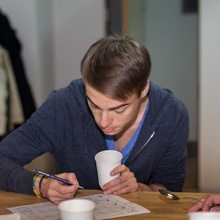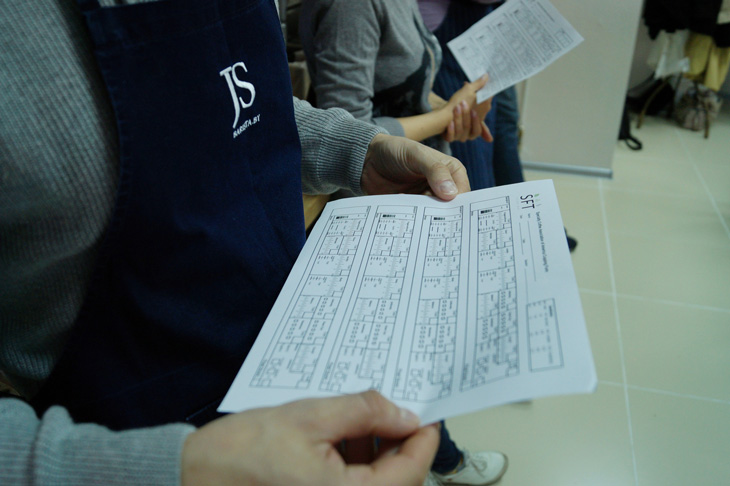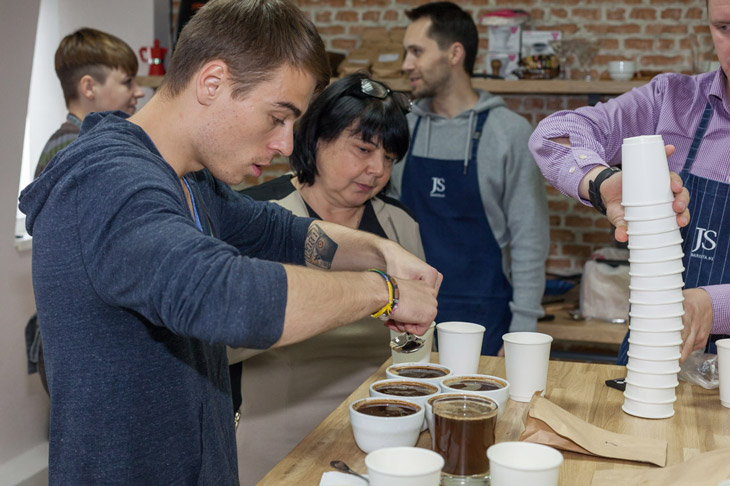Yuri Golovkov spoke about Q-graders and cupping according to SCAA standards

September 27 JS Academy hosted a seminar and cupping by Yuri Golovkov. Yuri is a certified Q-grader and a representative of the trading company SFT, that supplies green coffee in the CIS.
Who are Q-graders, why are they needed and what is Specialty Coffee?
Coffee is a product with a complex, multifaceted taste. And the more complicated is taste, the more valuable it is in the coffee market.
Coffee production is a process that involves several stages, each of which has a significant effect on the taste of the final product. In addition to such factors as botanical variety, height of growth, climate and soil composition, the taste of coffee can be affected by the amount of precipitation in a season, the way of harvesting berries (selectively, only ripe berries are picked or all). The ways of processing and fermentation of berries influence the taste too: the way they are dried (in the African "beds" or on the patio); how often they are mixed; how they are stored afterwards; how they are packed (just in jute sacks or in grain pro); how they are transported, etc. And, of course, the roasting of the seeds and methods of its brewing also influence the taste of the drink.
The most important question that interests everyone: from the farmer to the consumer is the cost. It’s no secret that coffee is grown on plantations in countries with a very low standard of living. Farmers grow coffee berries and sell them to processing stations, which are mainly owned by large state and foreign companies. To ensure that farmers on all continents receive an honest reward for their work, and the consumer paid a fair price for seeds or a drink, coffee should be professionally evaluated.

But how to assess the quality of coffee? After all, the tastes of each person are different: some people like sour coffee, some dense with sourness. In order to eliminate the subjective factor in the assessment of coffee, organizations SCAA (Specialty Coffee Association of America) and CQ (Coffee Quality Institute) created an international system of coffee quality assessment. A Q- grader-is a specially trained person who evaluates the quality of coffee in accordance with this system. thanks to the international system of assessing the quality of coffee Q-graders all over the world can communicate in one language. For example, a Q-grader from America and Japan, after tasting the same coffee in different parts of the world will assess it approximately the same, regardless of their personal taste preferences. Process of taste evaluation follows general rules, and the estimation of coffee is made by means of special forms developed by SCAA.
It should be noted that there are not many Q-graders in the world - only about 3500 and to get certified is not only expensive, but also very difficult. In addition to possessing an innate ability to delicate perception of flavors and tastes, as perfumers, coffee evaluators must undergo a series of very complex examinations.
The main task of Q-graders is the formation of a unified system for assessing the quality of coffee for business and trade.
Q-grading - is also an opportunity of independent evaluation of samples of coffee by the third party - the CQI, for example, if the seller and buyer of green coffee can not reach an agreement in the assessment of the coffee received. In this case, they send samples to CQI partner, which sends them to three Q-graders (who do not know exactly who sent the samples). The average score of the three Q-graders will be transferred to the interested parties.
The most important question the Q-grader faces when evaluating coffee is whether this type of coffee is specialty or not. You can learn about the specialty coffee in this article, but briefly - it’s high quality coffee, which, in addition to the absence of obvious defects, has some outstanding taste characteristics (whether it’s an unusual aftertaste or a special tint in taste). According to the SCAA rules - specialty coffee – is coffee without primary defects, no more than 5 secondary defects at 350 g of green coffee, absence of quakers in100 g sample of roasted coffee and the flavor gets 80 points or higher according to SCAA evaluation form.
Also it is worth explaining that the status of specialty coffee does not automatically mean that it is an elite coffee. The status of specialty, rather, simply distinguishes between "special" coffee (ie, in addition to some quality standards, having a taste different from others) and "ordinary" coffee (ie, coffee, which does not have any outstanding taste characteristics).

SCAA requirements for capping
To evaluate coffee all over the world adequately and fairly, SCAA developed a clear regulation of the cupping. Below we will describe the main points:
- To evaluate the quality of coffee, samples weighing 350 g are used
- Roasting time of the sample is from 8 to 12 minutes
- Roasting should be light
- Coffee should be cooled immediately after roasting
- From the time of roasting and until the tasting time 8 - 24 hours should pass
- The room should be free of foreign smells, well-ventilated
- Silence - is also one of the conditions for capping
- Tasting should be done blindly (ie tasters do not need to know in advance what coffee they are trying)
- Special glasses and spoons for cupping are used:
- Glasses 207-266 ml
- Diameter of neck of glass 76-89 mm
- Water should be of good quality with a TDS of 100-150 particles per ml
- The temperature of water in the preparation of cupping should be 93-95°C
- It is necessary to observe the ratio of 8.25 grams of ground coffee to 150 ml of water
- First, the grain is poured into the cups, then it is grinded into each cup separately (to avoid the spread of one defect in all the cups)
- First, the flavor of the grinding is evaluated, then the brewed beverage
- Brew coffee should be done not later than 15 minutes from the moment of grinding
- After the coffee was poured, it is necessary to wait for 4 minutes
- Then the aroma of the drink is evaluated. To do this, one should move the spoon over the surface of the drink three times “breaking” the coffee cap breathing the aroma
- Then the formed foam is removed
- Coffee should cool down to a comfortable temperature for tasting (it should not burn the mouth cavity)
- Trying coffee, it must be sprayed on the entire surface of the tongue, making a fast swallow from the sppon
During the seminar, we studied the cupping procedure and learned how to fill out a form to evaluate the coffee, set by the SCAA. It is very important to realize that cupping is a necessary tool for understanding the product in the coffee business.
Moreover, it is very important that people who are engaged in coffee both in Belarus and throughout the world speak the same language. At the seminar in just a couple of hours all participants could "calibrate" and come to a common understanding of the evaluation of coffee. Despite different taste preferences, at the last capping the participants evaluated several types of coffee and the difference in estimates for each sample was very little.

Of course, we have different tastes, but the main task of evaluating coffee according to SCAA standards - is the ability to describe and evaluate coffee excluding subjective factors. Thanks to Yuri, we became a bit closer to the coffee assessment system within the world coffee community. And it’s great! We believe that it is very important for the representatives of the coffee business to speak the same language, interact and develop together!

